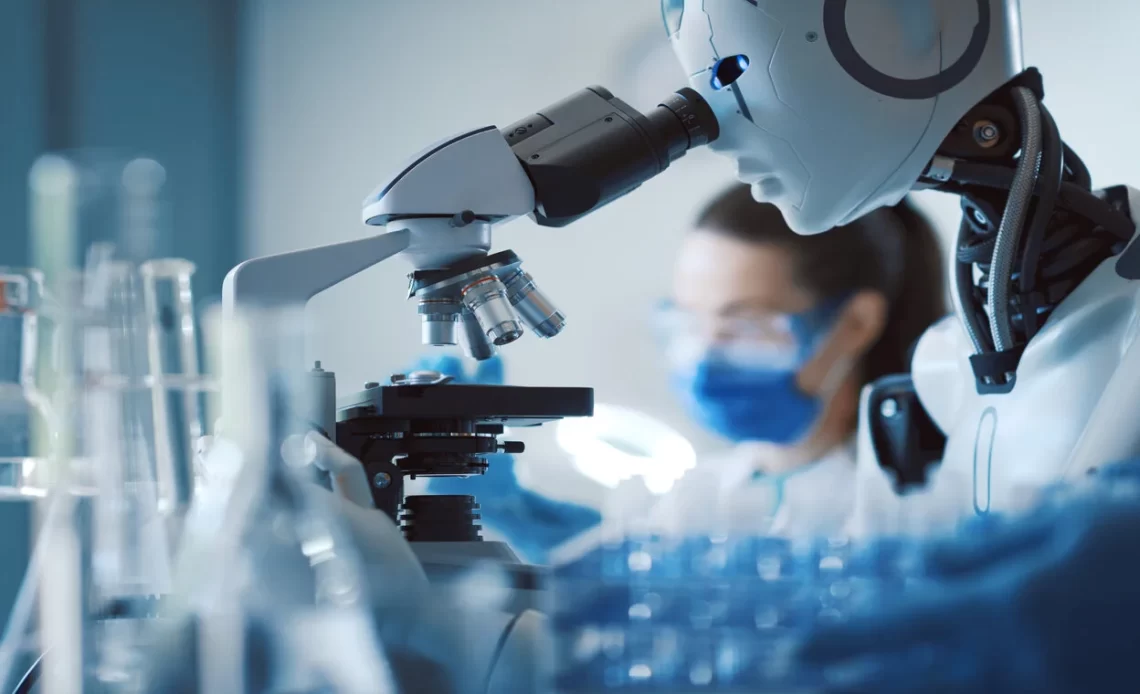
Table of Contents
Introduction
In recent years, the intersection of artificial intelligence (AI) and healthcare has led to groundbreaking advancements that are reshaping the way we approach diagnostics and treatment. The integration of AI technologies has ushered in a new era of precision medicine, enhancing the accuracy, speed, and efficiency of healthcare practices. In this article, we delve into how artificial intelligence is revolutionizing healthcare by transforming diagnostics and treatment methods.
Artificial Intelligence Application in Healthcare
Artificial Intelligence-Powered Diagnostics
In the realm of healthcare, accurate and timely diagnosis is the cornerstone of effective treatment. Traditionally, this process heavily depended on the experience and intuition of medical professionals, which, while valuable, was not immune to human limitations such as fatigue, oversight, and variability in interpretation. The emergence of artificial intelligence (AI) has introduced a transformative paradigm in diagnostics, harnessing the power of data analysis to enhance the accuracy, speed, and objectivity of medical diagnoses.
Medical Imaging Analysis
One of the most compelling applications of artificial intelligence in healthcare is its role in revolutionizing medical imaging analysis. Through the fusion of Artificial Intelligence algorithms and advanced imaging techniques, a new era of diagnostic precision and early disease detection has emerged. AI’s ability to meticulously scrutinize medical images, including X-rays, MRIs, and CT scans, empowers healthcare professionals to unlock invaluable insights that were previously hidden within the intricate details of these images.
Pathology and Histology
Artificial Intelligence can aid pathologists in analyzing tissue samples for cancerous cells, improving the accuracy and speed of diagnoses. Image recognition and pattern detection algorithms can assist in identifying abnormalities and predicting disease progression.
Risk Assessment
AI algorithms can analyze patient data, including medical history, genetic information, and lifestyle factors, to predict disease risk. This enables personalized preventative measures and interventions for high-risk individuals.
Enhancing Treatment Strategies
Beyond diagnostics, AI is reshaping the way treatments are designed and administered, leading to more effective and personalized care.
Drug Discovery and Development

AI algorithms can sift through vast databases of chemical compounds and predict their potential efficacy in treating diseases. This accelerates the drug discovery process and helps identify promising candidates for further research.
Precision Medicine
By analyzing genetic and molecular data, AI can identify specific treatment options tailored to an individual’s unique biological makeup. This approach optimizes treatment outcomes and minimizes adverse effects.
Treatment Personalization
AI-powered predictive modeling can analyze patient data to predict how individuals might respond to different treatments. This enables healthcare providers to customize treatment plans for better outcomes.
Remote Monitoring and Telehealth

AI-enabled wearable devices and remote monitoring tools can track patients’ vital signs and health metrics. Healthcare professionals can remotely monitor patients’ conditions and intervene if any abnormalities arise, ensuring timely care.
Challenges and Considerations
While AI holds immense promise in healthcare, it’s important to address potential challenges:
Data Privacy and Security
AI relies on large data-sets, raising concerns about patient data privacy and security. Striking a balance between data access and protection is crucial.
Regulatory Compliance
The integration of AI technologies must adhere to regulatory standards to ensure patient safety and ethical considerations.
Human-AI Collaboration
AI should be viewed as a tool to enhance human decision-making rather than replace medical professionals. Ensuring seamless collaboration between AI systems and healthcare providers is essential.
Conclusion
Artificial intelligence is reshaping healthcare by revolutionizing diagnostics and treatment strategies. The synergy between AI algorithms and medical expertise is unlocking new possibilities for accurate diagnoses, personalized treatment plans, and improved patient outcomes. As AI continues to evolve, its potential to transform healthcare remains limitless, offering a glimpse into a future where technology empowers medical professionals to provide more precise and effective care.
